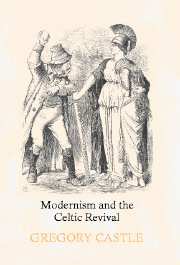Book contents
- Frontmatter
- Contents
- Acknowledgments
- List of abbreviations
- 1 The Celtic muse: anthropology, modernism, and the Celtic Revival
- 2 “Fair equivalents”: Yeats, Revivalism, and the redemption of culture
- 3 “Synge-On-Aran”: The Aran Islands and the subject of Revivalist ethnography
- 4 Staging ethnography: Synge's The Playboy of the Western World
- 5 “A renegade from the ranks”: Joyce's critique of Revivalism in the early fiction
- 6 Joyce's modernism: anthropological fictions in Ulysses
- Conclusion: After the Revival: “Not even Main Street is Safe”
- Notes
- Select bibliography
- Index
1 - The Celtic muse: anthropology, modernism, and the Celtic Revival
Published online by Cambridge University Press: 24 November 2009
- Frontmatter
- Contents
- Acknowledgments
- List of abbreviations
- 1 The Celtic muse: anthropology, modernism, and the Celtic Revival
- 2 “Fair equivalents”: Yeats, Revivalism, and the redemption of culture
- 3 “Synge-On-Aran”: The Aran Islands and the subject of Revivalist ethnography
- 4 Staging ethnography: Synge's The Playboy of the Western World
- 5 “A renegade from the ranks”: Joyce's critique of Revivalism in the early fiction
- 6 Joyce's modernism: anthropological fictions in Ulysses
- Conclusion: After the Revival: “Not even Main Street is Safe”
- Notes
- Select bibliography
- Index
Summary
ethnology, n. The science that treats of the various tribes of Man, as robbers, thieves, swindlers, dunces, lunatics, idiots and ethnologists.
Ambrose BierceModernism and the Celtic Revival emerged out of the necessity of finding a way to teach W. B. Yeats's Mythologies. In pursuing the implications of Yeats's role as a folklorist, I was led to anthropology and its influence on the Celtic Revival as well as to the conclusion that very little critical work had been done in this area. To be sure, critics like Philip Marcus, Mary Helen Thuente, Edward Hirsch, and Deborah Fleming have explored the aesthetic and political implications of folklore, legend, and myth in the production of Revivalist texts; but no one has explored in any extensive way the influence of anthropology on the way Revivalists represented Irish culture and the Irish people. This study attempts just such an exploration, beginning with a consideration of the work of two prominent Anglo-Irish Revivalists, Yeats and John M. Synge, before moving on to consider the Catholic-Irish writer, James Joyce, whose work can be read as a critique of the anthropological assumptions of the Celtic Revival. My contention is that for each of these writers the desire to revive an authentic, indigenous Irish folk culture is the effect of an ethnographic imagination that emerges in the interplay of native cultural aspirations and an array of practices associated with the disciplines of anthropology, ethnography, archaeology, folklore, comparative mythology, and travel writing.
- Type
- Chapter
- Information
- Modernism and the Celtic Revival , pp. 1 - 39Publisher: Cambridge University PressPrint publication year: 2001



